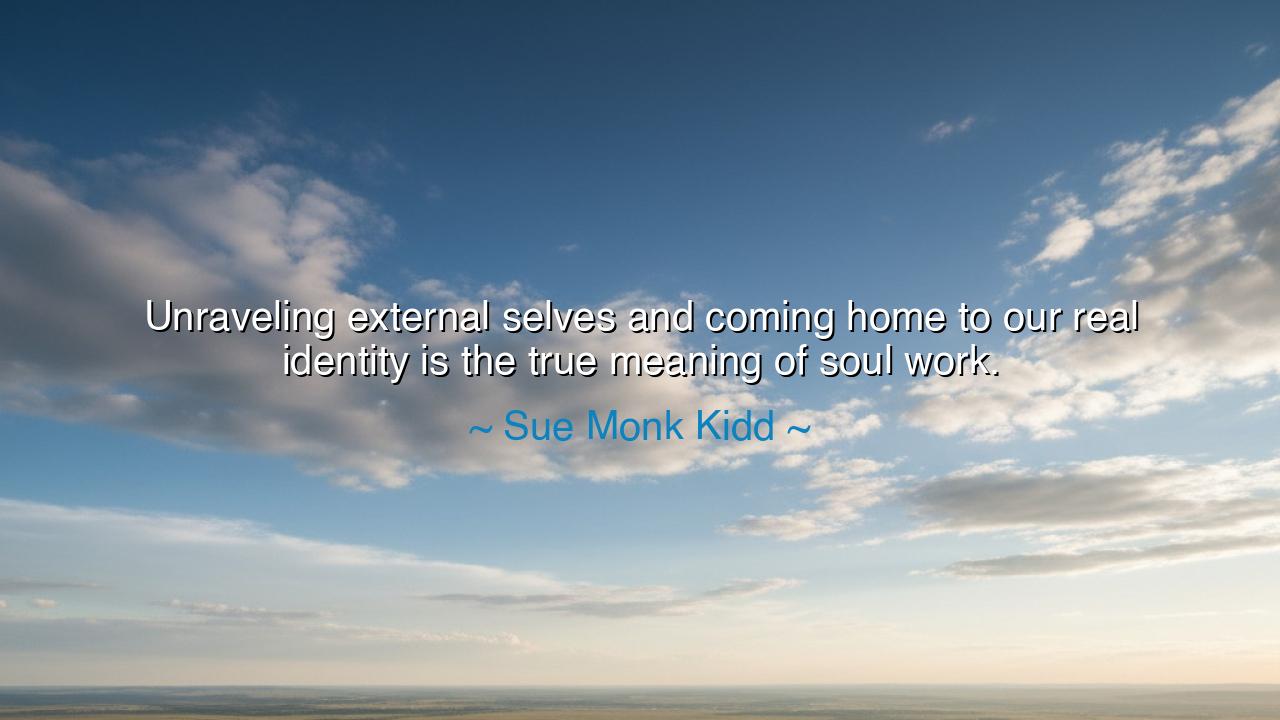
Unraveling external selves and coming home to our real identity
Unraveling external selves and coming home to our real identity is the true meaning of soul work.






In the luminous and contemplative words of Sue Monk Kidd, we find a truth that echoes through the ages: “Unraveling external selves and coming home to our real identity is the true meaning of soul work.” To the unreflective ear, this may sound gentle — a whisper of self-knowledge — yet beneath it lies the power of transformation. In these few words, Kidd captures the ancient and eternal journey of humankind: the pilgrimage inward, the sacred shedding of illusions, the return to the authentic self. Her phrase is both a map and a mirror — a map for those who wander in confusion, and a mirror for those ready to behold who they truly are.
Sue Monk Kidd, a writer of deep spiritual insight, speaks from a tradition that bridges mysticism, psychology, and feminine awakening. Her words are not of theory but of experience — of one who has walked the inner desert and learned that the hardest work of all is not the conquering of the world, but the understanding of the soul. When she writes of “unraveling external selves,” she speaks to the many masks we wear: the roles we perform, the expectations we inherit, the images we build to earn approval or belonging. Over time, these layers form an armor that conceals the truth of who we are. To “unravel” them is not an act of destruction, but of liberation — the slow, sacred process of returning to the center of being, where the soul itself dwells, pure and unburdened.
The ancients called this process metanoia, a turning of the heart, a rebirth of the inner eye. The philosopher Socrates declared that “the unexamined life is not worth living,” for to live without self-knowledge is to wander as a stranger within one’s own body. The mystics of every age — from the desert hermits of early Christendom to the Sufi poets who danced in devotion — understood that the greatest pilgrimage is not across mountains or seas, but within the chambers of one’s own heart. This is the soul work that Kidd describes: not labor of the hands, but labor of the spirit; not outward conquest, but inward clarity.
Consider the story of Siddhartha Gautama, who became the Buddha. Born into privilege, he lived surrounded by comfort and illusion. Yet one day, he left the palace walls and beheld suffering — old age, sickness, and death. The world’s glitter fell away from him, and he began the unraveling of his own “external selves.” He left behind wealth, title, and even his name to seek the truth within. Through meditation and renunciation, he discovered that peace does not come from what one possesses, but from what one releases. In his awakening beneath the Bodhi tree, Siddhartha did not become someone new — he simply returned to what he had always been: the self awakened, the soul unbound.
In our modern world, the wisdom of Sue Monk Kidd rings with renewed urgency. We live in an age of noise and performance, where identity is too often crafted by the gaze of others. The external selves multiply — the worker, the friend, the parent, the online persona — until the quiet voice of the soul is drowned beneath their chatter. We are praised for productivity, not presence; for image, not essence. Yet deep within, the spirit grows restless. It longs, as Kidd says, to come home — to step out of the illusions we serve and rediscover the sacred stillness of being. The one who dares to unravel their false identities does not lose themselves; they find themselves at last.
This process is not easy. It requires courage, humility, and patience. For when the outer masks fall away, we must face what lies beneath — the wounds, the fears, the long-forgotten dreams. Yet it is through this confrontation that the soul awakens. As the alchemists of old believed, transformation is born from fire; only by passing through the crucible of honesty can the gold of authenticity emerge. Each act of self-awareness — each moment of truth spoken, each fear faced, each illusion surrendered — becomes an offering at the altar of the spirit.
The lesson, then, is timeless and clear: to live truly, one must live inwardly. Begin the work of the soul by listening in stillness, by questioning what parts of your life are yours and what parts were given to you by others. Shed what no longer serves your becoming. Speak truth even when it trembles on your lips. Choose presence over performance. And most of all, have compassion for yourself as you journey home — for every unraveling is a rebirth.
Thus, in Sue Monk Kidd’s simple yet profound words, we find the echo of all great teachings: that the divine, the eternal, the real, is not far away but within. To return to it is not an escape from the world, but a redemption of it. The true meaning of soul work is to remember — to awaken to the light that has always burned within you, waiting patiently beneath the layers of who you thought you had to be. And when you find it, you will understand what the ancients knew: that coming home to your real self is the most sacred journey a soul can ever take.






AAdministratorAdministrator
Welcome, honored guests. Please leave a comment, we will respond soon